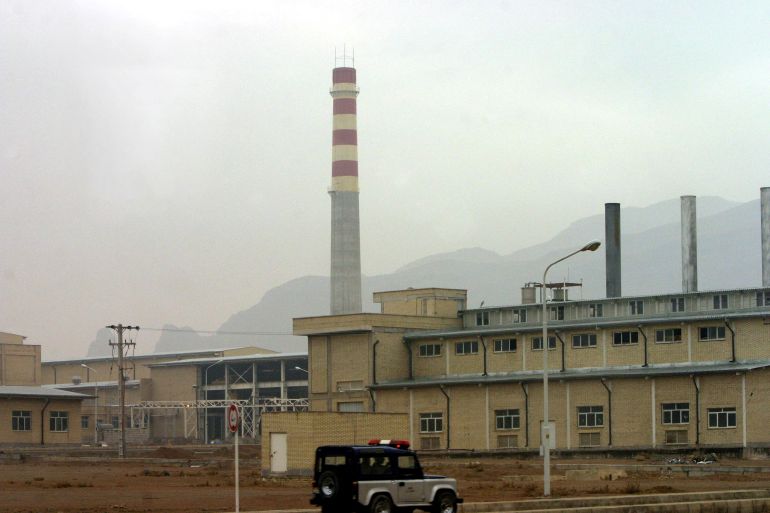Iran’s Zarif blames Israel for Natanz incident, vows revenge
Contrary to last year’s attack on Natanz, Iran has chosen not to shy away from directly blaming Israel and singling out its efforts to derail nuclear talks in Vienna.

Tehran, Iran – Foreign Minister Mohammad Javad Zarif vowed revenge against Israel for an attack on Iran’s main nuclear facilities at Natanz but said it will not stop high-level talks to restore the country’s nuclear deal with world powers.
In a private meeting with lawmakers on Monday, Zarif pointed out that top Israeli officials explicitly said they would try to prevent multilateral efforts to restore the Joint Comprehensive Plan of Action (JCPOA), which would lead to lifting United States sanctions on Iran.
Keep reading
list of 4 itemsIran calls blackout at Natanz atomic site ‘nuclear terrorism’
Iran tests newest advanced nuclear centrifuges
Iranian ship attacked in the Red Sea
“Now they think they will achieve their goal. But the Zionists will get their answer in more nuclear advancements,” the diplomat was quoted as saying by state-run IRNA.
He vowed “revenge” against Israel and said Iran would not fall into its trap by refusing to engage in talks that could see unilateral US sanctions lifted.
Zarif also promised Natanz will be built stronger than before, using more advanced centrifuges.
“If they think our hand in the negotiations has been weakened, actually this cowardly act will strengthen our position in the talks,” he said.
“Other parties to the talks must know that if they faced enrichment facilities that used first-generation machines, now Natanz can be filled with advanced centrifuges that have several times the enrichment capacity.”
Ali Akbar Salehi, the head of the atomic energy organisation, said an emergency power system was established at the Natanz facilities on Monday.
“Enrichment at Natanz has not been stopped and is going strong, although some of the machines that have been decommissioned need to be reevaluated,” he said.
The enrichment and centrifuge assembly lines in Isfahan’s Natanz, the country’s main facilities, were targeted by a large-scale blackout on Sunday that Iran called an act of “nuclear terrorism”.
Israel has not officially accepted responsibility for the attack but has imposed no censorship restrictions on its wide coverage by local media, some of which has explicitly said Israel’s spy agency Mossad was responsible.
Nournews, an outlet with ties to Iran’s security apparatus, cited an unnamed source at the intelligence ministry as saying the person who caused the power outage by disrupting the electrical system has been identified. Steps are being taken to arrest the unidentified individual, it said.
The foreign ministry spokesman also said Iran has already “started to communicate with international authorities and the United Nations” to legally pursue the attack at Natanz.
Israel’s Prime Minister Benjamin Netanyahu said on Monday that he would “never allow” Tehran to obtain nuclear weapons, but made no comment on Iran’s accusation that Israel had targeted Natanz.
“Iran has never given up its quest for nuclear weapons and the missiles to deliver them,” Netanyahu said. “I will never allow Iran to obtain the nuclear capability to carry out its genocidal goal of eliminating Israel.”
The US said it was “not involved in any manner” in the incident at Natanz.
Iran says its nuclear programme is only for peaceful purposes.
‘Infiltration phenomenon’
The nuclear talks in Vienna on Friday concluded a “constructive” opening week with delegates from Iran, China, France, Germany, Russia, and the United Kingdom slated to return on Wednesday.
US representatives are not officially part of the talks as Iran says it will not engage directly with them until all sanctions imposed by former President Donald Trump are lifted. However, European representatives relay messages to them.
On Monday, Iran’s foreign ministry spokesman Saeed Khatibzadeh said the centrifuges that were taken out as a result of the attack were first-generation IR1 machines, which will now be replaced by more advanced versions.
The attack came one day after Iran began feeding gas to a variety of more advanced locally made machines, including dozens of IR6, IR6s and IR4 centrifuges, and also commenced mechanical tests on IR9 machines.
The blackout further led to another incident as Behrouz Kamalvandi, the spokesman of Iran’s Atomic Energy Organisation, broke both his legs and fractured his skull while inspecting the damage at the Natanz site.
Reports say bits of aluminium sheets had covered a hatch that he stepped on, leading to a fall of more than 7 metres (23 feet). IRNA spoke with Kamalvandi by his hospital bed, where he said he has no doubt Iran’s nuclear programme will continue to advance.
The incident has also once more brought to the fore Iran’s shortcomings in protecting its nuclear assets.
In a tweet on Sunday, the secretary of Iran’s Expediency Council suggested a fire also broke out as part of the attack.
“Could the reoccurrence of a fire at the Natanz nuclear facilities, in less than one year following the previous explosion, be a sign of the seriousness of the infiltration phenomenon?” asked Mohsen Rezaei, a former commander-in-chief of the Islamic Revolutionary Guard Corps.
In June 2020, Natanz was hit by an explosion that caused a large fire, which was also suspected to have been orchestrated by Israel.
Iran had said “sabotage is certain” in that explosion, but did not publish more information because of security concerns.
Iran and Israel have been locked for more than a decade in a shadow war across the region that has recently increasingly spilled out in the open.
The latest examples have come in the form of a series of attacks on Iranian and Israeli ships, and the brazen assassination of Iran’s top nuclear and military scientist Mohsen Fakhrizadeh.